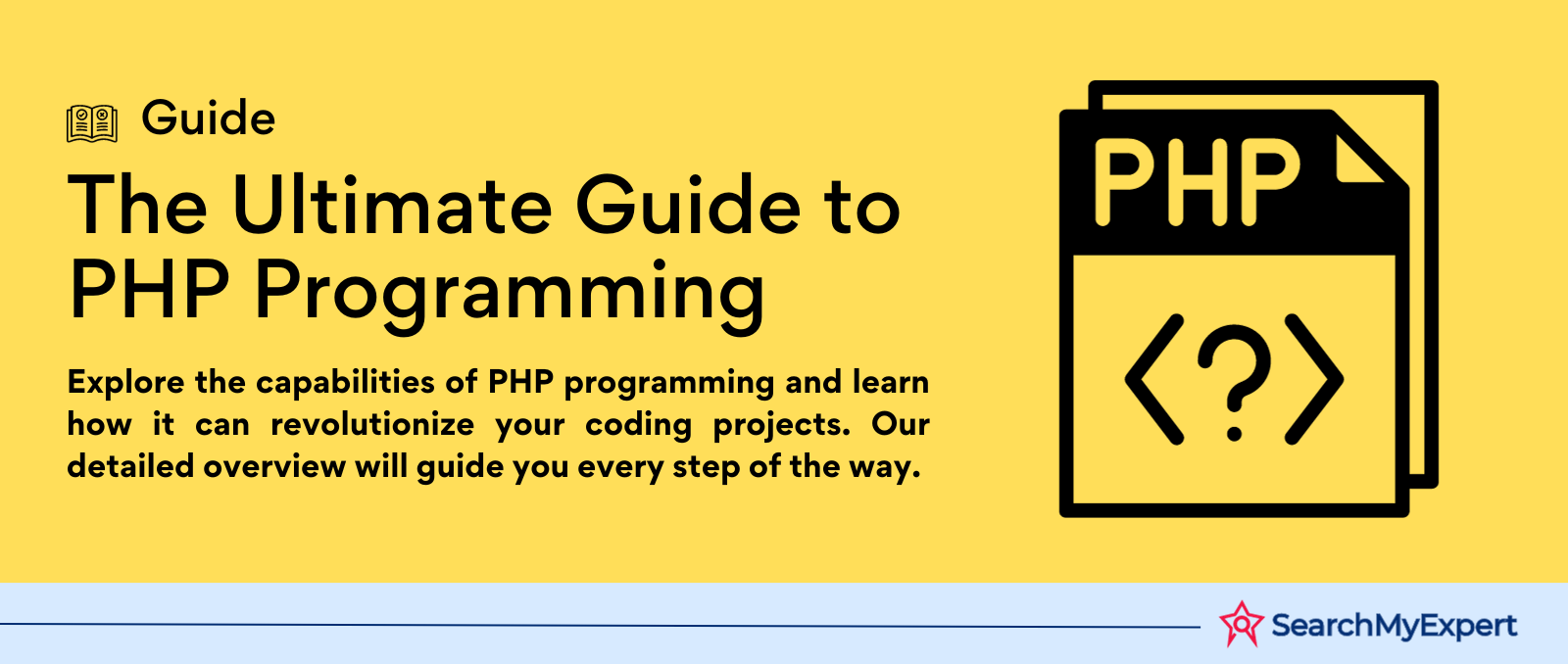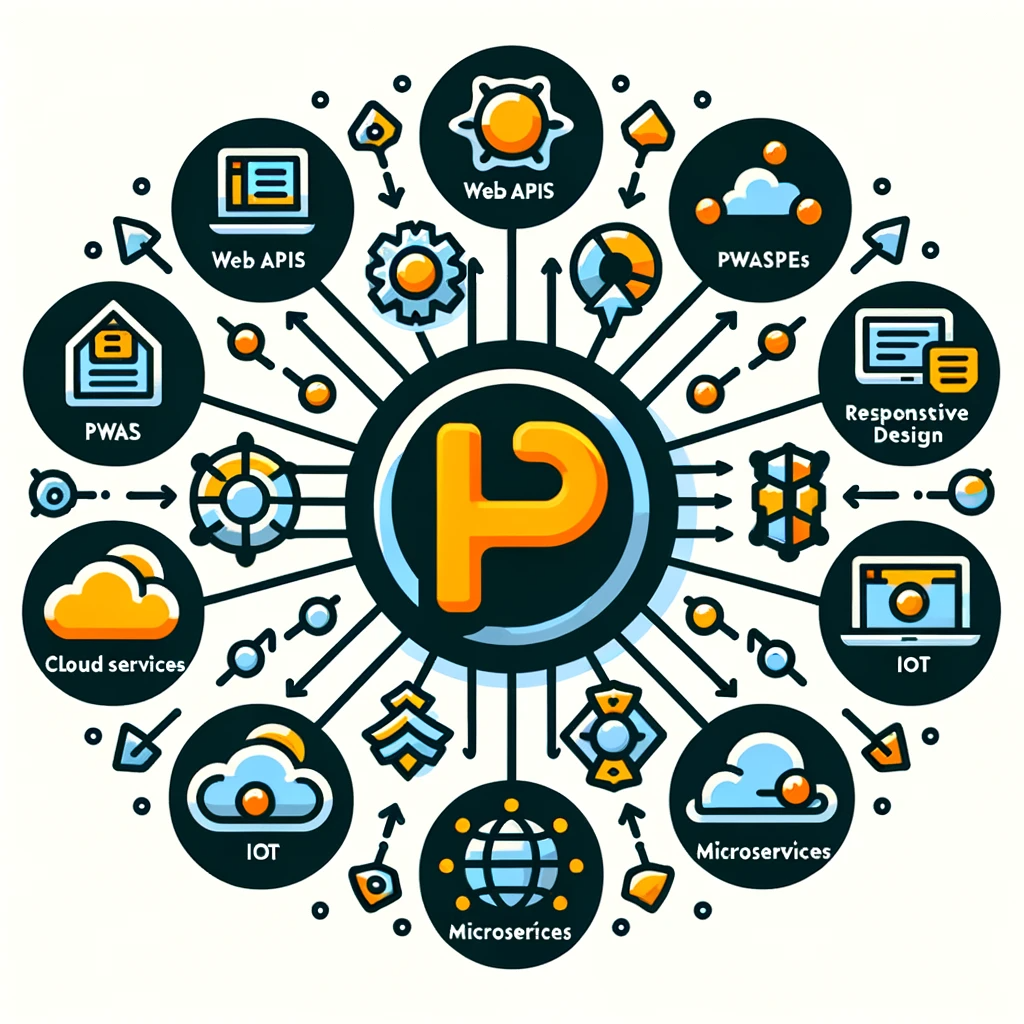PHP Programming: A Detailed Overview

PHP, often known as 'PHP: Hypertext Preprocessor,' is a powerful open-source, server-side programming language. Since its debut in 1994, it has undergone numerous updates, with PHP 8.1 being the most recent in 2022.
The Evolution of PHP
Initially, PHP meant 'Personal Home Page,' which was designed for personal document management. But as its functionalities grew, the acronym evolved to represent its broader capabilities.
PHP's Core Strengths
- Server-side Scripting: This is PHP's primary specialty. It allows web developers to run scripts on servers, offering dynamic content to users.
- Command-line Scripting: This is perfect for scheduled tasks. Whether you're using Linux's cron or Windows' Task Scheduler, PHP can handle it.
- Desktop Applications: While PHP may not be the first choice for desktop apps, seasoned web developers find it offers more flexibility than some of its rivals.
Beyond these areas, PHP excels in tasks like gathering form data, ensuring user data security through encryption, and managing cookies. One standout feature is its compatibility with all major operating systems, making coding accessible regardless of your device.
Getting Started with PHP
To code in PHP, you'll need:
- PHP Parser: Converts PHP code into a format that machines can understand.
- Web Server: Executes your PHP files to produce web pages.
- Web Browser: Helps you see the PHP page via the server, just like you would view other online content.
You can find detailed installation guides for these tools on the official PHP website.
Why Choose PHP?
- Cross-Platform: PHP works on all major operating systems, ensuring no compatibility issues.
- Open-Source: Being free, PHP eliminates cost concerns for your projects.
- Vast Community: Given its long history, there's a large pool of PHP developers and plenty of legacy code available to assist newcomers.
- Synergy with HTML: PHP integrates smoothly with HTML, making web development more streamlined.
- Ease of Learning: PHP's straightforward nature makes it more accessible than some complex alternatives.
- Rich Toolset: From code hinting to syntax highlighting, there's a plethora of tools available for PHP.
- Optimal Web Performance: PHP-driven websites often boast faster load times, essential for a superior user experience.
PHP's Current Standing
Despite being a stalwart in the programming world, PHP's popularity has seen some dips given the influx of newer languages. Platforms like PYPL and TIOBE rank it among the top ten, showcasing its sustained relevance. Renowned entities like Facebook, Wikipedia, WordPress, Etsy, and Slack continue to harness PHP's power, underlining its continued significance.
Starting Your PHP Journey
Before diving into PHP, mastering HTML is advisable. Not only does it lay a strong foundation, but it also enhances your PHP coding prowess. Many institutions, including Code Institute, offer courses in both, ensuring a holistic learning experience.
By understanding and leveraging PHP's multifaceted capabilities, developers can create robust, dynamic, and efficient web solutions catering to diverse needs.
PHP's Role in Modern Web Development
In today's digital era, web development is advancing at an unprecedented rate, with numerous languages and tools vying for dominance. Amidst this evolution, PHP has consistently held its ground, proving its adaptability and relevance in various web projects.
Diagram Showing PHP's Role in Modern Web Technologies.

PHP Frameworks: Boosting Development Efficiency
One of PHP's strengths in the modern era lies in its expansive range of frameworks. These frameworks offer a structured and streamlined approach to building web applications:
- Laravel: A top choice for many developers, Laravel simplifies tasks such as routing, authentication, and caching.
- Symfony: Known for its reusable PHP libraries, Symfony aids in tasks like form creation, object configuration, and routing.
- CodeIgniter: Lightweight and straightforward, CodeIgniter is renowned for its performance and speed.
- Zend: An object-oriented framework, Zend is packed with features but requires a steeper learning curve.
Using these frameworks, developers can speed up the development process, ensure better code maintainability, and deliver more reliable applications.
PHP and Database Management
PHP seamlessly integrates with various databases, the most common being MySQL. This integration allows for the creation of dynamic and data-driven web applications. With PHP's PDO (PHP Data Objects) extension, developers can effortlessly connect to multiple databases, making data retrieval and storage more efficient.
PHP and E-commerce
With the booming e-commerce industry, PHP has become a popular choice for developing online shopping platforms. Systems like Magento, WooCommerce (for WordPress), and PrestaShop are PHP-based, highlighting the language's capability to handle complex transactions, product listings, and user data.
Security in PHP
In the age of cyber threats, PHP offers robust security features. With tools like prepared statements for database access, CSRF (Cross-Site Request Forgery) tokens, and password hashing, PHP ensures that web applications remain secure against potential breaches.
The Future of PHP
While newer languages continue to emerge, PHP's continuous updates, coupled with its vast community, ensure that it remains at the forefront of web development. The recent releases, such as PHP 8.0 and 8.1, introduced features like the JIT (Just-In-Time) compiler and attributes, showcasing the language's commitment to innovation.
PHP in the Context of Web Hosting
In the realm of web hosting, PHP holds a significant position, driving countless websites and applications across the globe. Let's delve deeper into its relationship with web hosting and the advantages it brings to the table.
PHP's Compatibility with Hosting Services
A majority of web hosting providers offer PHP support, given its widespread use. Whether one opts for shared hosting, dedicated hosting, or even cloud hosting, PHP's presence is almost guaranteed. This universal support ensures that developers can deploy PHP-based projects with minimal friction.
Seamless Integration with Content Management Systems (CMS)
PHP plays a foundational role in many popular Content Management Systems:
- WordPress: One of the world's most popular CMS, WordPress is built on PHP. It powers a significant percentage of the web, from blogs to e-commerce sites.
- Drupal: Another heavyweight in the CMS arena, Drupal offers extensibility and scalability, thanks to PHP.
- Joomla: Recognized for its user-friendly interface, Joomla leverages PHP to provide a robust platform for web content management.
These CMS platforms, backed by PHP, empower individuals and businesses to create and manage web content with relative ease, even without deep technical expertise.
PHP's Scalability in Web Hosting
As websites grow in terms of traffic and complexity, scalability becomes paramount. PHP's architecture is inherently scalable, allowing developers to expand their applications in response to increasing user demands. Tools like PHP-FPM (FastCGI Process Manager) further enhance its scalability, ensuring that PHP-based websites can handle large volumes of traffic without compromising performance.
Cost-Effective Hosting Solutions with PHP
Given that PHP is open-source, it brings a cost advantage. Web hosting providers don't need to pay licensing fees for PHP, which often translates to more affordable hosting packages for end-users. This cost-effectiveness, combined with PHP's robust performance, offers tremendous value to businesses and individual developers.
PHP Versions and Hosting
It's crucial for developers to be aware of the PHP versions supported by their hosting providers. Newer versions bring improved performance, enhanced security, and additional features. Regularly updating PHP ensures that web applications remain secure, efficient, and in line with modern development practices.
The Hosting Community's Contribution to PHP
The symbiotic relationship between PHP and the hosting community has led to collaborative efforts in enhancing the language. Feedback from hosting providers, combined with real-world usage data, often influences the development and refinement of PHP. This collaboration ensures that PHP evolves in alignment with the actual needs of the web hosting industry.
The Symbiosis of PHP with Modern Web Technologies
As we further explore the vast expanse of PHP's influence, it's pivotal to understand its synergy with contemporary web technologies. This interplay ensures that PHP remains not just relevant, but also at the forefront of the rapidly evolving digital landscape.
PHP and Web APIs
Application Programming Interfaces (APIs) have become integral in fostering connectivity between applications. PHP, with its flexible nature, seamlessly integrates with various APIs, allowing for dynamic data exchange and enhancing web application functionalities. Popular APIs, such as those provided by Google Maps, Twitter, or payment gateways, can be effortlessly integrated into PHP projects, thereby enriching user experiences.
Responsive Web Design with PHP
In an era where users access websites from a plethora of devices, from desktops to smartphones, responsive design is non-negotiable. PHP, in conjunction with front-end frameworks like Bootstrap, ensures that websites are not only functional but also responsive, adjusting flawlessly across different screen sizes and resolutions.
PHP and Progressive Web Apps (PWAs)
Progressive Web Apps, which combine the best of web and mobile apps, are gaining traction. PHP serves as a robust backend solution for PWAs, handling data processing, authentication, and other server-side tasks, ensuring these web applications deliver performance comparable to native mobile apps.
Integration with Cloud Services
Cloud computing is revolutionizing the way applications are deployed and scaled. PHP's compatibility with cloud platforms, such as AWS, Google Cloud, and Microsoft Azure, allows developers to harness the power of cloud infrastructure, ensuring high availability, redundancy, and scalable solutions.
PHP and IoT (Internet of Things)
The Internet of Things, a network of interconnected devices, is reshaping industries. PHP, given its server-side capabilities, plays a role in data collection, processing, and analytics for IoT devices. By integrating with IoT platforms, PHP can manage real-time data streams, making it vital in this new age of connected devices.
Microservices Architecture with PHP
Modern web applications often adopt a microservices architecture for scalability and maintainability. PHP, with frameworks like Laminas and Slim, can be employed to build efficient microservices, ensuring that each service operates independently, yet harmoniously within the larger application ecosystem.
Continuous Integration and Continuous Deployment (CI/CD) in PHP Projects
The modern software development lifecycle emphasizes swift, frequent releases. PHP projects can integrate with CI/CD tools like Jenkins, Travis CI, or GitHub Actions. This ensures automated testing and deployment, reducing manual intervention and accelerating the release cycle.
Conclusion
The versatility of PHP is evident in its wide-ranging applications and its adaptability to modern web technologies. Its deep-rooted synergy with contemporary tools and practices underscores its enduring relevance. As the digital realm continues to expand and innovate, PHP's role as a foundational pillar in web development remains unchallenged, testifying to its robustness and versatility in meeting the ever-evolving demands of the digital age.
Navigate the Next in software by exploring these top
Software Development Companies.
share this page if you liked it 😊
Other Related Blogs

Mastering Docker for App Development: A Comprehensive Guide to Benefits, Use-Cases, and Alternatives
STAY UP TO DATE
GET PATH'S LATEST
Receive bi-weekly updates from the SME, and get a heads up on upcoming events.
Contact Us











